By: Mark Abrams
In the course of normal business while working on radios, our people have to be well versed in many trades. Our work takes us into remote areas including many national forests with diverse wild life, state parks with unique vegetation, mountains with extreme cold, desert with intense heat, places like Death Valley where we are below sea level and high mountains with thin air and many other places where almost anything can happen. When we travel to these locations, we must be prepared to handle any situation that confronts us because there is usually no help available that can get to us in a short period of time to provide the assistance that we need. So, as we travel to many of our sites which at times exceed a 7 hour drive from our office, we have to be prepared to deal with the unexpected. Some of our radio tower sites are 3.5 hours south, while others are more than 7 hours north along the inland desert and still others are 5 hours north along the coast and even more sites are 4-5 hours to the east and to the southeast. With the vast area that we travel to maintain our radio network and to support our customer base, the possibilities are endless as to what we will encounter.
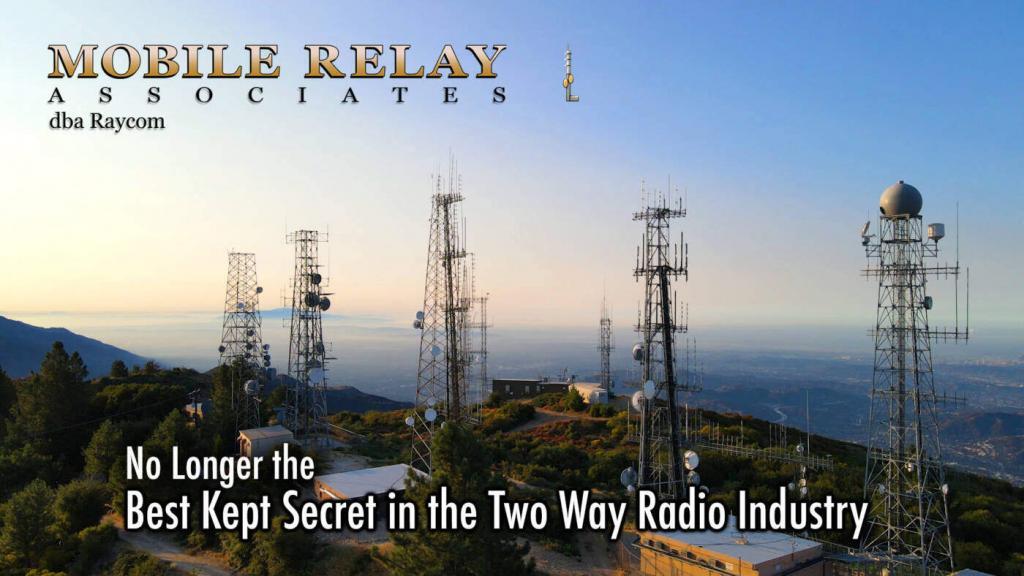
We often need to deal with issues that can affect the performance of the radio equipment but is not an actual radio problem. When these items occur, we must dip into our treasure chest of skills so that radio communications can be restored and continue to function with reliability. Our skills are vast and we demonstrate our abilities of how to deal with the different situations that regularly surprise us.
Here are some of the things that we encounter and the skills required to deal with the situation:
- Locksmith: When we travel to the radio sites, the access road often has a locked gate for which we do not have a key or combination. We then must demonstrate our ingenuity to open the gate with our key collection, lock picks, combination repository, reciprocating saw, band saw, grinder or other method of opening the gate. When we get to the building, sometimes the key does not open the lock to the building, thus making it impossible to gain access to the equipment that needs service work. The ability to overcome these obstacles are necessary to get our work done in a timely manor.
- Road Builder: Many of the roads that we travel are anything but smooth. They often contain major ruts and washouts. Often, there are rock slides that must be cleared or brush that needs to be cleared. We have to work on the road to get up to the tower site and sometimes, there is a need to work on the road to get down from the tower site because something happened to the road while we were at the tower site. One such story is told in RESCUING GENERAL TELEPHONE AT MT LUKENS
- Electrician: It is not uncommon to find out that the reason for the radio failure is a problem with the electrical system in the building. We must then troubleshoot the power problem which is sometimes as simple as resetting a circuit breaker, but is often something more complicated. We must then use our skills to fix the power system.
- Roofer: When we arrive at a transmitter site and find that there are water leaks that can potentially damage the radio equipment, it is now time to find and repair the roof leak. This can be a simple or complicated repair depending upon the situation at hand.
- Pest Control:
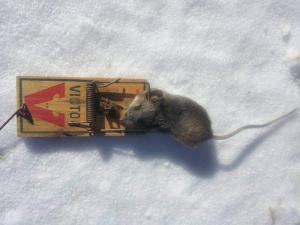 There have been many times when we have found rodents who have invaded the radio equipment building and have either damaged the equipment or are working on damaging the equipment. Rats instinctively chew because their teeth continue to grow and the chewing prevents the teeth from becoming too long. They chew on wires and destroy many pieces of equipment through their chewing, urinating and defecating on the equipment. They also carry many diseases which make working on the equipment that they have damaged somewhat dangerous from a disease standpoint.
There have been many times when we have found rodents who have invaded the radio equipment building and have either damaged the equipment or are working on damaging the equipment. Rats instinctively chew because their teeth continue to grow and the chewing prevents the teeth from becoming too long. They chew on wires and destroy many pieces of equipment through their chewing, urinating and defecating on the equipment. They also carry many diseases which make working on the equipment that they have damaged somewhat dangerous from a disease standpoint.
- Carpenter: When ice falls from the tower, sometimes the ice damages the roof. Oftentimes it causes a roof leak that must be repaired. However, on other occasions, the falling ice structurally damages the roof by cracking the roof joists. These must be repaired so that the roof will remain intact during future storms.
- Tower Climber:
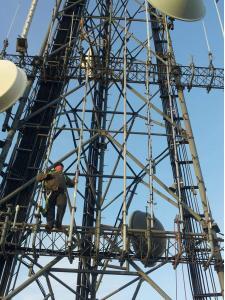 Sometimes the problem with the radio system involves repairing the antenna or antenna cable on the tower. People who climb towers are specially trained for climbing towers which can be a dangerous task. The person who responds to fix the radio system is usually not a tower climber but has often been trained in proper climbing procedures and then must do something to get the radio system back on the air by mounting a temporary antenna on the building or on the tower.
Sometimes the problem with the radio system involves repairing the antenna or antenna cable on the tower. People who climb towers are specially trained for climbing towers which can be a dangerous task. The person who responds to fix the radio system is usually not a tower climber but has often been trained in proper climbing procedures and then must do something to get the radio system back on the air by mounting a temporary antenna on the building or on the tower.
- Generator Tech: Some sites are powered full time by a generator while others use generators for backup power. When the main power fails from the power company, the site is powered by the generator. If the generator develops a problem, we then need to become a generator technician to fix the generator power. One such story is told in REPAIRING THE GENERATOR ON MT LUKENS
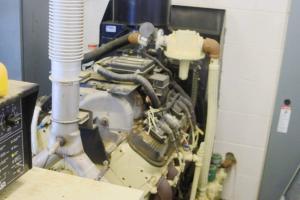
- Transfer Switch Tech: When power fails, the generator is started and power is transferred to the building by the transfer switch. If the transfer switch does not detect the power failure and transfer the building from commercial power to the generator properly, the generator serves no useful purpose. The switch is subject to failure like any other device and must be fixed when it fails.
- Telephone Repairman: Many radio systems use dedicated telephone lines to control the radios and some radios use telephone lines to provide the ability to make phone calls through the radios. Any time the telephone line malfunctions, the radio system does not perform as expected and we become telephone line troubleshooters to determine the cause of the telephone line trouble. We will fix whatever is fixable, but most of the telephone line troubles are past the point of demarcation where it is exclusively in the purview of the telephone company where we are not allowed to fix the trouble or not able to physically access the trouble point.
- Microwave Repairman: Many radio systems are connected together into a network using telephone circuits or microwave links. Whenever the microwave link has malfunctioned, it is necessary to repair the microwave link and now we become microwave radio technicians to get the radio system back to being fully operational.
- Tire Technician: Whenever we are traveling to a radio site, we generally have to be prepared to handle all contingencies including replacing flat tires. Many of the roads that we travel are rough at best and contain a large quantity of rocks that tend to damage tires. It is common for us to have to change tires because getting a tow truck to where we are located several miles behind locked gates is often not an option. See our story about TWO MOUNTAINTOPS IN ONE DAY
- Animal Control: There have been many times when we have been attacked by different animals from snakes to rodents, from insects to raccoons and from bear to bobcats. MRA personnel have to deal with whatever comes our way with bravery and professionalism whenever we travel off road to the tower sites. Since most of our tower sites are controlled by the US Forest Service or the BLM (Bureau of Land Management and NOT Black Lives Matter), we have to use care to obey the rules of these agencies regarding our interaction with these animals. One such story is told in the story THE RACCOON
- Auto Mechanic: Whenever we are traveling to a radio site, we generally have to be prepared to handle all contingencies including repairing the vehicle. Many of the roads that we travel are rough at best and are often steep which causes the engine to work hard while taxing the cooling system. We have had many vehicles break down on these roads which required us to become auto mechanics to repair the problems with the vehicles since getting a tow truck is not a viable option. One such story is told in STUCK ON SUNSET RIDGE. Another such story is told in STUCK ON SANTIAGO PEAK.
- Janitor: Our radio sites are almost all located in remote locations at the top of hills or mountains. These sites do not have any maid service, so the responsibility of cleaning the site falls onto the radio technicians that work at the site. It is not unusual to sweep a floor, or clean up rodent droppings, clean up water leaks, clean up debris that accumulates at the site, throw away trash, etc. All trash must be hauled down from the building to be deposited in the trash at the office.
- HVAC Technician: Almost all radio buildings contain ventilation fans or air conditioning. Many problems develop with air conditioners over time since they are mechanical devices. We often have to replace motors, start capacitors, relay contactors belts, oil bearings or perform other tasks that are normally done by HVAC technicians.
- Gate Repairman: Many times that we attempt to access locked roads, there is something wrong with the gate mechanism besides the lock issue discussed above. Often we have to repair the gate so that we can get it opened or closed. This story is told in A TRIP TO TEJON
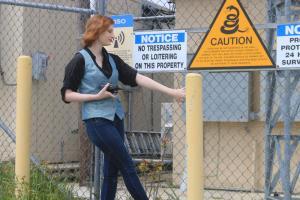 Chain Link Fence Repairman: Many radio sites are surrounded by a chain link fence which gets damaged by weather, accident or vandalism over time. MRA then has to become a fence repairman in order to access the site and secure the site when leaving. This was done at Tejon Mountain when we leased the radio site from the land owner and proceeded to fix up the site before moving our equipment into the site.
Chain Link Fence Repairman: Many radio sites are surrounded by a chain link fence which gets damaged by weather, accident or vandalism over time. MRA then has to become a fence repairman in order to access the site and secure the site when leaving. This was done at Tejon Mountain when we leased the radio site from the land owner and proceeded to fix up the site before moving our equipment into the site.
- Toxic Material Handlers: Batteries and other materials used in radio communications contain toxic materials that must be handled and disposed of properly. MRA personnel often must handle these materials and become expert in safely handling these items to prevent health or environmental problems. Some of the batteries that we have installed at the tower sites weigh as much as 604 pounds per battery which makes them difficult to handle aside from their toxic nature.
- Lift Operator: Many times we have to run cables below high ceilings in buildings which require the use of man lifts. Our personnel have been trained and certified as lift operators by taking the courses to properly handle this type of equipment whenever it needs to be used. Recently, we had to use a man lift to hang our computerized outdoor sign.
- Gardner: Many of our tower sites are located within the National Forests where we have to meet brush clearance requirements. When that becomes necessary, we have to remove weeds and brush to create safe areas around the buildings so that in case of fire, we are reasonably safe and have a reasonable chance of surviving the wildfire. This must be done every year in springtime or early summer. We must remove all the materials from the forest and dispose of them at the local dump.
- Earth Mover:
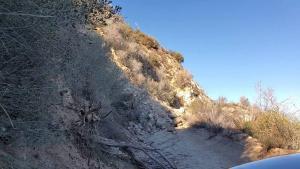 At times the rain causes severe water runoff which can compromise the radio building or the radio tower. In such cases, we have to move dirt and install sandbags to divert the water to prevent catastrophic damage to life and property.
At times the rain causes severe water runoff which can compromise the radio building or the radio tower. In such cases, we have to move dirt and install sandbags to divert the water to prevent catastrophic damage to life and property.
- Hiker: There have been many times when the road has been blocked by fallen trees, landslides, mudslides or other debris when it has become necessary to hike to the site from some distant location. MRA personnel have often had to hike to a radio site for up to 3 miles carrying tools, test equipment and parts to facilitate the repair of the radio system. This story is told in THE LANDSLIDE ON MT LUKENS
- Painter: Radio sites like any other building requires periodic maintenance. Getting workers up to the site is often challenging so when the site needs to be painted which is often it is done by our personnel. So becoming an expert painter is another skill that we exhibit at times.
- Professional Driver: In wintertime, it is common to encounter mud, snow and ice while traveling to a radio tower site. Our people have to be trained in driving under adverse conditions. When it rains, one of our tower sites is accessed through an area of gooey clay which fills up all the treads in the tire causing the vehicle to be driving on “slicks”. Several of our tower sites access through snow and ice which often form snow and ice drifts which can get a vehicle stuck without prior notice. Other times, we have to access the tower site via rough and rutted roads.
- Search & Rescue: Many of our tower sites are at the end of long dirt roads which have many hazards. It is not uncommon to find civilian people and/or vehicles on the road whenever the gates are open. Other times we find people hiking the road for exercise or to enjoy the outdoors. Unfortunately, some of these people are not properly prepared for the environment and end up getting themselves into trouble. When we encounter these people, we rescue them. Sometimes the people separate and then we have to search for them to affect a rescue. Such was the time we rescued two people from the LA RICS project who were heading to Mt Lukens in a pickup truck without a spare tire and they had a flat time. They then attempted to walk down the mountain, but the lady was having trouble so the man left her behind and got lost in the process. This could have ended very badly if we had not taken the time to search for the missing people and rescue them. This story is told in RESCUING LA RICS ON MT LUKENS.
Another such example is told in the story of RESCUING PRIVATE (CITIZEN) RYAN.
- Drywall Installer:Most radio sites do not use drywall for room dividers because it is easily breached, damaged, scuffed, dented and removed. Radio systems are often secured to prevent vandalism and tampering so drywall is not commonly used at radio sites since the walls are not secure. However, whenever a radio site does use drywall, it will need some attention at some point. Our personnel have rebuilt and moved interior walls made of drywall.
- Door Installation & Repair: Radio sites being located in remote locations often are subject to vandalism. There are times when we must repair a door that has been jimmied, dented, smashed or bent. Knowing how to restore normal door function is often essential to being able to access the building at the tower site. It is very difficult and expensive to get a door installer to a radio site, so we must take on the job ourselves most of the time.
- Bee Keeper: Bees move in to a site, we have to convince them to go elsewhere.
As you can see from the above list, we must be versed in the field of many different specialties to accomplish the day-to-day requirements of being in the two-way radio business. We do it with pride and passion which gives us the ability to overcome all the obstacles that are thrust in front of us so that we keep your communications operating through thick-and-thin. No other two-way radio company has the success record that MRA has the ability to exhibit for all of our customers to see.
Thank you for being our customer. We strive to earn your business every day.